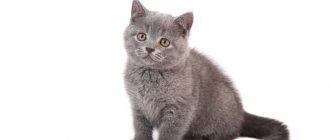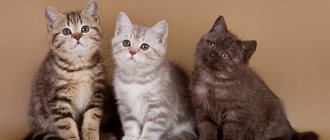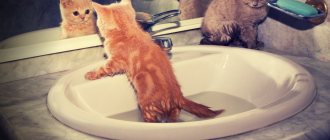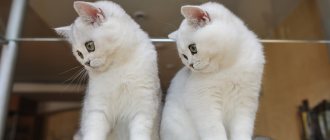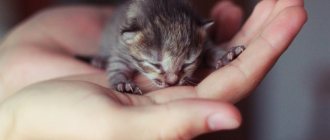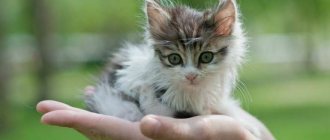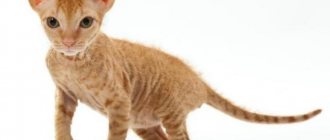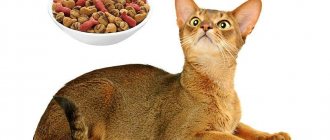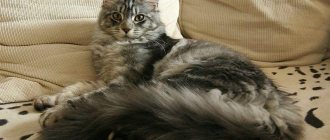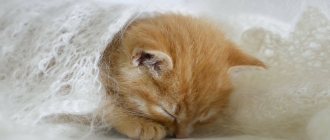Description of the breed of British kittens
Most of all, little Britons look like charming plush toys: a round muzzle, huge eyes, small ears with rounded tips, soft short fur.
The colors of the breed are varied: red, white, black, tortoiseshell, tabby, more than 200 varieties in total. The physique is strong, they give the impression of strong heroes.
The chest is wide, the paws are neat, the toes are gathered into a ball. The nature of the kids is good-natured, they easily get used to all family members, without singling out favorites. They get along easily with other animals and are loyal to children.
It is advisable to buy a British dog from a nursery or through a club. In this case, purchasing a kitten, which after six months has turned into an animal whose grandmother, as Bulgakov said, sinned with a diver, tends to zero. These babies have documents confirming their belonging to the breed.
In the future, the pedigree will allow us to participate in exhibitions and give access to breeding. If the owner is far from the idea of winning prizes at competitions and just wants a pet of a certain appearance and character, you can buy a kitten from trusted breeders who are ready to present both parents and vouch for the purity of the blood in the absence of a metric.
Russian nurseries
Where can you buy a British kitten in Moscow:
- Tamaky*ru, Cattery of British cats Moscow. They offer British Shorthair kittens of different colors and ages with vaccinations and certificates.
- Style of Provence, nursery of British cats by Lyudmila Mikheeva. They have been breeding professionally for 10 years. Pets are offered vaccinated, trained and with a set of bright photographs.
- Joy Land, a British cattery, breeds pets of blue and lilac, cream and cinnamon colors.
Before you bring the furry miracle home, you need to remember: an animal, not a toy. This is a living creature, small and defenseless. And it is the owner’s responsibility to take care of it.
British kitten: at what age can you adopt
Most people want to adopt a pet at the age of 4-6 weeks, citing the successful experiences of friends. It's nice to play with the baby, watch his growth, the formation of his character. But for the fluffy one, weaning from his mother before 12 weeks is a traumatic factor.
By three months, the young Briton had completed a full course of breastfeeding, which has a positive effect on the immune system, the functioning of the digestive tract, and was separated from his mother by her own mother, without any trauma to the delicate child’s psyche.
The kitten has acquired the skills to use a litter box, can eat on its own, and has passed the first stage of vaccination. He is less dependent on his brothers, sisters, and cat.
He makes contact with strangers more easily and is ready to explore the big world. It will be easier for him to settle into a new home, get used to other people, and learn to communicate with animals (if he has any). The optimal age for introduction into a new family is 10-12 weeks.
Be sure to read:
British cat: character, care and maintenance, sterilization, when to vaccinate, feeding, what diseases they are susceptible to
Kitten 1 month
The period of appearance of bear-type kittens. Month-old kittens are formed unevenly; a large body on short thick legs reminds us of a small bear. They sleep 16–20 hours, are very active, and play a lot.
4 weeks
Month-old kittens drink water on their own for 4 weeks, many eat wet and dry food themselves, and go to the litter box. Time to work with the kitten and adapt to the hands, teaching manners. The “change of color” of the eyes from blue to orange (for blue color), this happens gradually.
1 month
5 – 6 weeks | After 1.5 months, the kitten licks its fur and washes itself, the undercoat thickens, and the color becomes brighter.
5 weeks
At 7–8 weeks, babies are still drinking their mother’s milk and learning cat wisdom from her. The eyes acquired their color, became bright and clear.
1.5 months
What should you buy for a British kitten?
You should prepare well in advance for the arrival of a British kitten in your apartment; the list should include:
- A carrier - in it the baby will come home, visit the clinic, etc.
- A rubber comb that does not damage the thick undercoat;
- Three bowls – two smaller ones for dry and wet (natural) food, a larger one for water;
- Tray and shovel for solid waste;
- Tray filler – pressed sawdust, flavored granules, silica gel. Any option has its supporters, it is better to purchase the one that the kitten is accustomed to from the breeder;
- Toys - balls, sticks with feathers, wind-up mice;
- A house and a scratching post.
You need to create a first aid kit: thermometer, pipette, small syringe, activated carbon, manganese, disposable syringes, cotton swabs, bandage, bandage.
Tray training
Usually, a kitten is taken from the nursery, which the cat has trained to use the tray, as an example. Breeders are also involved in education. But in a new place he may get confused. How to train a British kitten to use a litter box, steps:
- Show the litter box to the kitten.
- Pour in the litter and rustle in the tray with your hands, trying to interest your pet.
- Take your cat to the toilet after eating and sleeping.
- If the kitten manages to make a puddle, soak a napkin in the urine and put it in the tray.
Loose stools
Diarrhea in a kitten can be a sign of an allergy. In this case, contact with a possible allergen is excluded, antihistamine drops are given, or an injection is given in the clinic. It is important to determine why a British kitten has diarrhea and take action.
Food poisoning or infection can also cause diarrhea. In case of poisoning, do not feed for 1 day, give water and sorbent. If infection is suspected, exclude the possibility of plague.
Swallowing a piece of bag or string can cause loose stools. You need to monitor the animal: the object has not passed through the intestines, you need to take the baby for an ultrasound. A tick bite and the presence of worms also show a similar reaction in the kitten’s body. Give the anti-worm medication according to the instructions and the age of the baby. A tick bite, in addition to diarrhea, gives fever and shortness of breath: urgently need the help of a specialist.
How to care for a British kitten
Acclimatization takes about 2-3 days. At this time, the attitude towards the new resident should be even, friendly, and not intrusive. Let him look around calmly. Places for toileting and feeding are determined immediately, shown to the kitten and not changed. Potentially hazardous areas should be fenced off.
If the baby crawls under the sofa, you don’t need to force him out behind the closet; after a while he will crawl out on his own. Children are given preliminary instructions, explaining that the animal cannot be constantly disturbed or disturbed while eating or sleeping. Forbid him from dragging him by the tail, squeezing him incessantly, or hurting him.
Once settled, the Briton will not require any special care. It is enough to keep the tray dry, clean, bowls full (dry food) or feed hourly (natural food), change the water daily, and comb the coat. This breed is quite independent, but the growing pet provokes the owners to play, comes to lie next to them, and caresses them.
What and how to properly comb British kittens?
The plush coat is a distinctive feature of the breed. You will have to teach your baby to comb from the first days. It is better to purchase several accessories to keep the fur in decent shape: a rubber mitten, a comb for the undercoat (used as needed), a comb that imitates a cat's tongue.
It massages the skin well and removes fallen hairs. British cats are combed against the grain and in the direction of hair growth. You cannot use a slicker brush; it will ruin the undercoat.
During the active molting season, cats are given special means to free their stomachs from lumps of licked fur - bezoars. It is worth bathing your pet in case of severe contamination, no more than 1-2 times a year.
The use of human, including baby shampoos and soaps is strictly prohibited. It is necessary to buy a special product for short-haired breeds, taking into account the color, and rinse thoroughly after soaping. Treatment with flea and tick medications is periodically necessary, especially for individuals walking on the street.
How to raise a British kitten
The British respond to affection. You can't force someone to follow the rules. You cannot hit a kitten with your hand or with a newspaper, it will be afraid of people and run away. The popular method of sticking your muzzle into a puddle or a pile can cause fear, and the situation will repeat itself due to the negative reaction of the animal.
Be sure to read:
Kitten weight by month: table, features for different breeds, how much they weigh at birth
Moreover, you should not throw a slipper at a kitten, this is akin to throwing a chair at a guilty child. The size and weight of a slipper multiplied by the acceleration of the flight can cause serious injury: concussion, fracture, severe bruise. Feeling love, the pet will strive to adapt to the owner’s requirements, wanting to receive praise and a treat.
Care instructions
It is a well-known fact that monthly grooming for British kittens is extremely important. So, the kitten needs to wash its ears once a week. This is especially true if your pet is fold-eared (born as a result of a connection between the British and Scottish breeds, although this is not recommended). It is best to rinse with hydrogen peroxide or baby oil.
At 1 month, veterinarians advise deworming your pet. But it’s not necessary to bathe your baby yet.
In any case, it is important to remember that the little Briton is not a toy, he is your friend who needs help and sincere care. Remember that we are always responsible for those we managed to tame!
Source
How and what to feed British kittens
A growing body needs food that satisfies it with calories, nutrients, and vitamins. You should not offer kittens food prepared for people: salt and spices are dangerous to the animal’s health.
The following are strictly excluded:
- fat meat;
- River fish;
- smoked meats, pickles;
- sweets;
- bakery products.
Proper, nutritious nutrition is the basis for good health and a long life for your pet.
Dry food for British kittens
Selected according to age. You need to choose a quality premium, holistic, super premium product. Such food is made from good meat, vegetables, contains vitamin supplements, and is balanced in composition. Cheap “Whiskas”, “Friskas”, etc. are made from feathers, waste from the meat industry, and grain husks.
Gluten and starch contained in excess cause allergies. A table with serving sizes is indicated on the packaging. Ready-made dry food is a convenient option for working owners. The animal must have free access to water.
Feeding a kitten with natural products
A natural diet must include:
- lean meat - veal, chicken, beef;
- offal - heart, liver, kidneys, lungs, stomachs;
- sea fish;
- raw vegetables;
- steamed rice, buckwheat.
- eggs, dairy products.
The meat is pre-frozen for 2 days to kill the worm eggs, the fish is boiled until half cooked, and separated from the bones. Cereals and vegetables are mixed with protein foods in a 2/1 ratio.
Store-bought feed
Only high-quality premium and holistic industrial feeds are suitable for constant nutrition. Giving an animal economy-class food is highly discouraged, since it is not of high quality and the composition is unbalanced. In the future, if such food is regularly consumed, serious health problems may arise.
When choosing ready-made food, you can consult a veterinarian, or study the assortment in pet stores and choose food designed for the British breed. If a kitten purchased from a nursery has already been accustomed to dry food and eats only this way, you should feed the baby the same brand that the breeder used.
Recommended industrial feeds for the British breed
On mobile, you can scroll the table horizontally with your finger.
| Food name/class | Features and Benefits | Flaws |
| Royal Canin British Shorthair (premium) | A special food developed only for the British breed. The food granules have a large, curved shape, which is why the animal cannot swallow it whole, and the granules themselves promote active cleansing of the teeth and oral cavity. The composition contains taurine, Omega-3 acids, which strengthen the heart and circulatory system. | Natural meat and fish are replaced with proteins of plant origin. |
| Go! Natural Cat Chicken, Fruit, & Vegetable (holistic) | Protein – 32%. Components:
The composition contains taurine, which strengthens and supports the functioning of the heart. Suitable for feeding kittens and British adults. | Some components of the food are allergic and can cause allergies. |
| Hill's Nature's Best With Real Chicken Adult Cat (Premium) | Protein – 30%. Components:
The composition contains many vitamins and mineral elements. The food is intended for British children from 12 months, taking into account all their physiological characteristics. | The presence of corn in the composition can provoke an allergic reaction. |
| Earthborn Holistic, Primitive Feline Natural Cat Food (holistics) | Protein – 44%. Components:
Balanced composition, including calcium, vitamins, phosphorus. Suitable for animals that must follow a diet. | High price. |
| Bosch Sanabelle Grande (super premium) | Proteins – 31%. Components:
Mussels help strengthen joint and cartilage tissue. The food contains Yucca extract, which reduces the odor of cat excrement. Helps prevent the formation of kidney stones. | Quite a high cost. Lack of information from the manufacturer regarding the type of antioxidant included in the feed. |
British kitten: when to vaccinate
Before vaccination, it is necessary to treat the kitten against fleas, and 2-3 days after disinfestation, give an anthelmintic drug. After 10 days, antihelminthic measures are repeated and after another 10 days you can go for an injection.
The first time vaccination is carried out at the age of 10-12 weeks, using a complex drug (Nobivak, Multftel-4, Felovax, etc.), which protects against:
- rhinotracheitis;
- calcevirosis;
- panleukopenia.
After three weeks, revaccination is done. After 14 days, the body will develop immunity and the cat can be released outside and transported around the city. Rabies vaccination is given separately. It is convenient to get a passport; it states the dates of vaccinations and what drug was used.
Without such a document, the animal cannot take part in exhibitions, club matings, travel on the train, or cross the border. Vaccinations are done annually. This procedure is necessary for all cats, including those who do not go outside. An infection can be brought into a home by a person on clothes or shoes.
Be sure to read:
What food should you feed your adult Scottish Fold cat and kitten?
Common diseases in British kittens
British kittens born in a good cattery and given the right care are more likely to have good health. They can get a cold by sitting in a draft, being in a cold room for a long time, or on the street.
Infectious diseases are dangerous for them, so you should not ignore timely vaccination. When contacting infected animals, they “catch” lichen, ear mites, fungus, etc.
Of the breed-specific pathologies, it is worth noting hypertrophic cardiomyopathy (HCM). It manifests itself in adults; for timely detection, it is recommended to perform an ultrasound of the heart at the age of 1 year, and then repeat the procedure every 2 years.
Sometimes owners are faced with pet diarrhea caused by poor diet, hair loss due to stress, liver and kidney disorders, vitamin deficiency, claw fungus, and tartar.
Prohibited Products
Including certain foods in the diet of British Shorthair cats can have serious consequences.
- Milk can only be given to kittens up to six months old. This is due to the fact that in childhood a large amount of the enzyme lactase is secreted. This compound is necessary for the digestion of milk, namely, for the destruction of glycosidic bonds of disaccharides. As the pet grows and develops, the production of this enzyme gradually ceases. This situation leads to the fact that the pet cannot completely digest the milk. Consumption of the product as an adult can affect the condition of the digestive system. The clinical picture is usually represented by stool disturbances, general malaise and vomiting.
- Pork is the most dangerous meat in terms of helminthiasis. Most parasites are localized in the internal organs and muscles of cattle. Moreover, pathogens can be in different states - both at the larval and adult stages. As a result of the fact that pigs often receive uncleaned feed, helminths can enter their body. Raw meat containing the pathogen infects the cat. The further clinical picture depends on the type of parasite. But in most cases, helminthic infestation without treatment leads to severe depletion of the body and death of the animal. In the early stages of the disease, complete recovery is possible in 95-100% of cases. Pork is also dangerous in terms of fat content. Excessive intake of lipids and cholesterol can provoke serious diseases of the cardiovascular system in the animal in the future. Therefore, preference is given to dietary meat varieties.
- Food from the owner's table is strictly prohibited for the pet. Fried, spicy, highly salted, smoked foods can lead to poisoning of the body, the development of gastritis and peptic ulcers if the animal is regularly fed incorrectly. The cat is a carnivorous predator, so food should be close to natural nutrition in nature.
- Plants of the legume family create unfavorable conditions in the intestinal lumen - fermentation occurs during digestion. The pet experiences discomfort in the abdomen due to increased formation of gases.
- Chicken and fish bones are dangerous for cats, as there is a risk of them getting into the respiratory tract. In addition, trauma to the soft tissues of the oral cavity is possible, followed by suppuration in the area of damage.
- Dietary supplements, vitamins, and medications intended for humans are strictly prohibited from being given to cats. Despite the fact that usual medications are used in veterinary practice, if a pet becomes ill, they should be purchased through veterinary pharmacies. This is due to the fact that the products have special dosages and dilutions intended for use by animals.
1111
